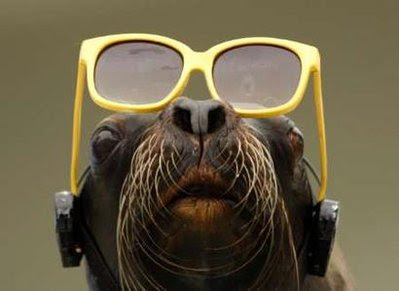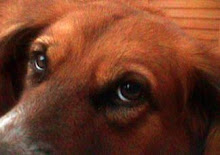 Das ist Luke (in manchen Artikeln auch Rook), ein 21 jähriger Seelöwe vom Sunshine International Aquarium in Tokio, am 22.Juli, dem Tag mit der totalen Sonnenfinsternis...Luke war bereits einen Monat zuvor durch seinen Trainer Hideo Yamabe auf dieses spezielle Ereignis vorbereitet worden. -
Das ist Luke (in manchen Artikeln auch Rook), ein 21 jähriger Seelöwe vom Sunshine International Aquarium in Tokio, am 22.Juli, dem Tag mit der totalen Sonnenfinsternis...Luke war bereits einen Monat zuvor durch seinen Trainer Hideo Yamabe auf dieses spezielle Ereignis vorbereitet worden. -This is Luke (some articles refer to him as Rook), the 21 year old sea lion from from Sunshine International Aquarium in Tokyo on July 22, the day of the total solar eclipse...He was prepared by his trainer Hideo Yamabe already one month before to wear these special sun glasses for that special occasion...
 Leider ließ sich nichts Schriftliches darüber finden, wie er auf das eigentliche Event reagiert hat...-
Leider ließ sich nichts Schriftliches darüber finden, wie er auf das eigentliche Event reagiert hat...-Unfortunately nothing written was to be found about the way he reacted to the real thing...
 Denn daß eine Sonenfinsternis sich auch auf Tiere auswirkt, wurde bereits bei früheren Gelegenheiten beobachtet...Folgend ein paar Artikel, die ich gefunden habe (engl.)-
Denn daß eine Sonenfinsternis sich auch auf Tiere auswirkt, wurde bereits bei früheren Gelegenheiten beobachtet...Folgend ein paar Artikel, die ich gefunden habe (engl.)-That solar eclipses effect animals too has been recorded already during earlier occasions...
"Abnormal and extreme behaviours were determined during the observation times. Birds, cattle, bees and horses felt the solar eclipse about 45, 20, 65 and 35 min before it occurred, respectively. They showed this via their behaviours. When the total solar eclipse occurred between 14.37 and 14.39 h, laying hens and broilers crowded together. They were very quiet and restless. Gulls stopped flying and were quiet and restless. Sparrows and crows were careful and afraid and they did not fly or sing. They crowded together in the trees and they were very nervous and afraid. All horses and cattle become very quiet, they did not move and they sniffed the air. They were very restless, shaking their tails and heads. A slight buzzing sound came from the bee hives. In conclusion, birds, cattle, bees and horses exhibited abnormal and extreme behaviours during the solar eclipse."

Animal reaction to solar eclipse
While people enjoyed the solar eclipse, what about the animals? Were they confused or afraid? Wuhan TV reporter Wan Xinghua went to the city's zoo to see their reactions.
Shortly before 9 in the morning, when one third of the sun was covered by the moon, birds at the zoo were flying around, apparently confused.
And the Wuhan Zoo tigers appeared irritable and restless, walking to and fro.
Li Tao, Zoo keeper of Wuhan Zoo, said, "The tigers are behaving quite abnormally today. They usually walk calmly after breakfast. But today they seem easily annoyed."
When the sun was completedly covered by the moon, the zoo plunged into darkness.
The tiger became more anxious, as if it thought it was time to hunt for food.
Du Youshun, chief engineer of Wuhan Zoo, said, "Usually at this time of morning, Xi Wang and Wei Wei (pandas) are enjoying bamboo. Today, the sudden darkness confused them. They thought it was the evening and fell asleep."According to Du Youshun, most primates thought it was just a normal day. When the sun came out after several minutes of darkness, the gibbons yapped as they usually do in the morning.
Swans were the only animals obviously frightened. Usually, they search for food in the morning in a relaxed manner. But today, a group of swans gathered in the center of the lake, waiting quietly, as if they were preparing to escape in case of an emergency.
But when the sun came out again, the swans spread out swum about elegantly.
HANGZHOU, July 22 (Xinhua) -- When thousands of people thronged outdoors for the longest total solar eclipse of the 21st century, animals at the zoo in east China's Hangzhou City also reacted, quickly and confusedly.
Two Indian elephants, each at five tonnes, seemed to know nothing that solar eclipse occurs when the moon comes between the earth and the sun blocking the sun rays. When the sun became invisible at about 9:35 a.m., the elephants dropped the grass on their trunks and returned to their dorms without hesitation.
Three giraffe gathered at a corner when darkness fell. They stood still and looked around. Two minutes later, two giraffes returned to their homes while another stayed outside, still wondering about the phenomenon.
Monkeys became the noisiest group at the zoo. The monkeys who usually frolic on mountain retreated to their caves. Two lemurs could not stop crying in the caves as they did at night.
The shadow of the moon disoriented birds whose body clock and direction depend on the sun. Red-crowned cranes and flamingoes that had been wandering or drinking water suddenly fell asleep during the brief blackout of eclipse. But when the sun rays came out again several minutes later, the birds emerged from their cages and started the life of another "day."
The solar eclipse was a first for most of the animals at the zoo. Birds and elephants are more sensitive to sun rays and showed more of a reaction than tigers, lions, leopard and pandas, said Jiang Zhi, a zookeeper.
But as the eclipse did not last long, all the animals at the zoo quickly resumed their normal lives, he said.
- China: Wuhan Zoo and here, Shanghai Wild Animal Park
- India: Bhopal Zoo and also here and here
- Eclipse Safari (NASA- about previous observations/June 2001)
- Abstract about the effects of a previous solar eclipse on animal behaviour/August 11-1999
Photo credits:Luke or Rook with Trainer & glasses...,yahoo, YorikoNakao(Japan Society of Animals-last photo in the dark)
More pics of the eclipse you can find here....
















































1 Kommentar:
This is very interesting. Thanks for sharing it.
Kommentar veröffentlichen